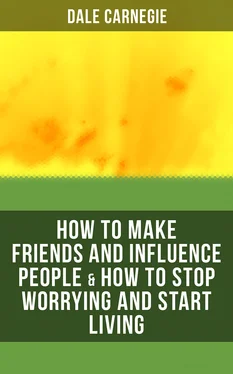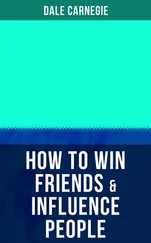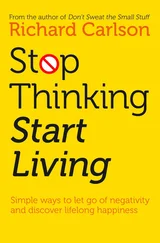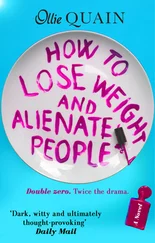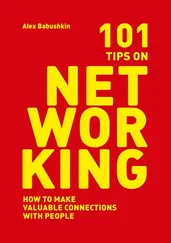The storyteller was sitting on my right; and Frank Gammond, an old friend of mine, was seated at my left. Mr. Gammond had devoted years to the study of Shakespeare, So the storyteller and I agreed to submit the question to Mr. Gammond. Mr. Gammond listened, kicked me under the table, and then said: "Dale, you are wrong. The gentleman is right. It is from the Bible."
On our way home that night, I said to Mr. Gammond: "Frank, you knew that quotation was from Shakespeare,"
"Yes, of course," he replied, "Hamlet, Act Five, Scene Two. But we were guests at a festive occasion, my dear Dale. Why prove to a man he is wrong? Is that going to make him like you? Why not let him save his face? He didn't ask for your opinion. He didn't want it. Why argue with him? Always avoid the acute angle." The man who said that taught me a lesson I'll never forget. I not only had made the storyteller uncomfortable, but had put my friend in an embarrassing situation. How much better it would have been had I not become argumentative.
It was a sorely needed lesson because I had been an inveterate arguer. During my youth, I had argued with my brother about everything under the Milky Way. When I went to college, I studied logic and argumentation and went in for debating contests. Talk about being from Missouri, I was born there. I had to be shown. Later, I taught debating and argumentation in New York; and once, I am ashamed to admit, I planned to write a book on the subject. Since then, I have listened to, engaged in, and watched the effect of thousands of arguments. As a result of all this, I have come to the conclusion that there is only one way under high heaven to get the best of an argument - and that is to avoid it .
Avoid it as you would avoid rattlesnakes and earthquakes.
Nine times out of ten, an argument ends with each of the contestants more firmly convinced than ever that he is absolutely right.
You can't win an argument. You can't because if you lose it, you lose it; and if you win it, you lose it. Why? Well, suppose you triumph over the other man and shoot his argument full of holes and prove that he is non compos mentis. Then what? You will feel fine. But what about him? You have made him feel inferior. You have hurt his pride. He will resent your triumph. And -
A man convinced against his will
Is of the same opinion still.
Years ago Patrick J. O'Haire joined one of my classes. He had had little education, and how he loved a scrap! He had once been a chauffeur, and he came to me because he had been trying, without much success, to sell trucks. A little questioning brought out the fact that he was continually scrapping with and antagonizing the very people he was trying to do business with, If a prospect said anything derogatory about the trucks he was selling, Pat saw red and was right at the customer's throat. Pat won a lot of arguments in those days. As he said to me afterward, "I often walked out of an office saving: 'I told that bird something.' Sure I had told him something, but I hadn't sold him anything."
My first problem was not to teach Patrick J. O'Haire to talk. My immediate task was to train him to refrain from talking and to avoid verbal fights.
Mr. O'Haire became one of the star salesmen for the White Motor Company in New York. How did he do it? Here is his story in his own words: "If I walk into a buyer's office now and he says: 'What? A White truck?
They're no good! I wouldn't take one if you gave it to me. I'm going to buy the Whose-It truck,' I say, 'The Whose-It is a good truck. If you buy the Whose-It, you'll never make a mistake. The Whose-Its are made by a fine company and sold by good people.'
"He is speechless then. There is no room for an argument. If he says the Whose-It is best and I say sure it is, he has to stop. He can't keep on all afternoon saying, 'It's the best' when I'm agreeing with him. We then get off the subject of Whose-It and I begin to talk about the good points of the White truck.
"There was a time when a remark like his first one would have made me see scarlet and red and orange. I would start arguing against the Whose-It; and the more I argued against it, the more my prospect argued in favor of it; and the more he argued, the more he sold himself on my competitor's product.
"As I look back now I wonder how I was ever able to sell anything. I lost years of my life in scrapping and arguing. I keep my mouth shut now. It pays."
As wise old Ben Franklin used to say:
If you argue and rankle and contradict, you may achieve a victory sometimes; but it will be an empty victory because you will never get your opponent's good will.
So figure it out for yourself. Which would you rather have, an academic, theatrical victory or a person's good will? You can seldom have both.
The Boston Transcript once printed this bit of significant doggerel:
Here lies the body of William Jay, . Who died maintaining his right of way-He was right, dead right, as he sped along, But he's just as dead as if he were wrong.
You may be right, dead right, as you speed along in your argument; but as far as changing another's mind is concerned, you will probably be just as futile as if you were wrong.
Frederick S. Parsons, an income tax consultant, had been disputing and wrangling for an hour with a goverment tax inspector. An item of nine thousand dollars was at stake. Mr. Parsons claimed that this nine thousand dollars was in reality a bad debt, that it would never be collected, that it ought not to be taxed. "Bad debt, my eye !" retorted the inspector. "It must be taxed."
"This inspector was cold, arrogant and stubborn," Mr. Parsons said as he told the story to the class. "Reason was wasted and so were facts. . . The longer we argued, the more stubborn he became. So I decided to avoid argument, change the subject, and give him appreciation.
"I said, 'I suppose this is a very petty matter in comparison with the really important and difficult decisions you're required to make. I've made a study of taxation myself. But I've had to get my knowledge from books. You are getting yours from the firing line of experience. I sometime wish I had a job like yours. It would teach me a lot.' I meant every word I said.
"Well." The inspector straightened up in his chair, leaned back, and talked for a long time about his work, telling me of the clever frauds he had uncovered. His tone gradually became friendly, and presently he was telling me about his children. As he left, he advised me that he would consider my problem further and give me his decision in a few days.
"He called at my office three days later and informed me that he had decided to leave the tax return exactly as it was filed."
This tax inspector was demonstrating one of the most common of human frailties. He wanted a feeling of importance; and as long as Mr. Parsons argued with him, he got his feeling of importance by loudly asserting his authority. But as soon as his importance was admitted and the argument stopped and he was permitted to expand his ego, he became a sympathetic and kindly human being.
Buddha said: "Hatred is never ended by hatred but by love," and a misunderstanding is never ended by an argument but by tact, diplomacy, conciliation and a sympathetic desire to see the other person's viewpoint.
Lincoln once reprimanded a young army officer for indulging in a violent controversy with an associate. "No man who is resolved to make the most of himself," said Lincoln, "can spare time for personal contention. Still less can he afford to take the consequences, including the vitiation of his temper and the loss of self-control. Yield larger things to which you show no more than equal rights; and yield lesser ones though clearly your own. Better give your path to a dog than be bitten by him in contesting for the right. Even killing the dog would not cure the bite."
Читать дальше
